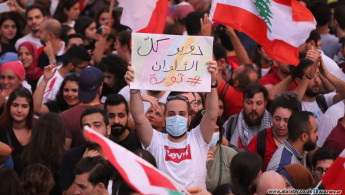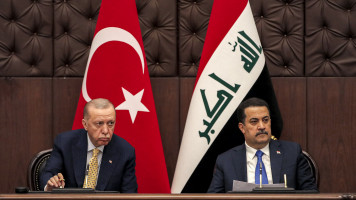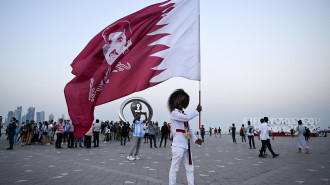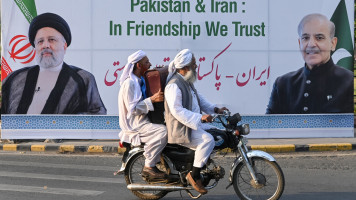Refugees in Lebanon watch protests with hope and caution
As of 2019, there are an estimated 1.5 million Syrian refugees in Lebanon, while estimates of Palestinian refugees who have been in the country since 1948 range from 174-400,000. Both refugee populations face distinct problems in Lebanon; Syrians face forced returns to Syria, while Palestinians face limitations of their work and ability to buy land.
In Tripoli, water and first aid items were left for protesters by Syrian refugees in the city, asking for protesters not to be racist.
Twitter Post
|
Twitter Post
|
"But as far as the protests are concerned, this is a right for the poor people who have been robbed by their government. The Lebanese people remained silent for years and gave the government years to find solutions without any result.
"Things instead got worse and the government passed decrees against Syrian refugees, forcing them to return home and saying it was safe when they knew this would be bad for any Syrian outside his country. Returning home would mean death," he said.
Accordingly, in a protest in Downtown Beirut, protesters were filmed chanting "Bassil... out out, refugees, in in", in reference to Gebran Bassil, the Foreign Minister who has repeatedly made xenophobic comments in reference to refugees in Lebanon.
However, in the past, Syrians and Palestinians have also been blamed for the dire conditions faced by Lebanese people, with accusations that the large refugee populations hire rent prices, and lower wages. Such sentiments mean some are alert to what the protests could mean for refugee communities.
"The warlords know the game and they know how to play it. They know that they can scapegoat foreigners as it sort of worked in 2015, and the Lebanese are largely very nationalistic already," said Joey Ayoub, a Lebanese writer and researcher who helped organise the 2015 civil society dominated movement in Lebanon.
"It's worth noting that the pro-refugee chants are in the minority. Most protesters, truth be told, are simply not thinking about refugees at all. The protests are overwhelmingly just 'patriotic' and they regularly cross into nationalistic chants (pro army etc) which can, but don't always, cross into xenophobic stuff," he added.
"You even had 'Lebanon first' chants ala Trump. It's meant to be against the sectarian system though, even though that can easily be manipulated as well."
Notably, Lebanon's protests can be seen to bridge sects and regions, often experiencing tension since the country's devastating civil war, with Tripoli chanting in solidarity with Daheih.
However, some fear that refugees may become the new existential enemy with the new-found solidarity among the Lebanese.
"In fact, you can easily say that a lack of nationalism is perceived as one of the main problems, seen (optimistically) as some kind of civic nationalism or (pessimistically) the more xenophobic kind," said Ayoub.
"The main sign of the risk is the absence of Syrians and Palestinians. You'd have some in individual capacity obviously (it's not like you can tell the Lebanese from the non-Lebanese apart most of the time) but no Palestinian or Free Syrian flags, and that's not going to change."
However, Palestinians and Syrians are unlikely to become involved in the protests.
"The Lebanese people are right and we support their demands. But what is involved to accuse us that we are entering Lebanese internal affairs," said Fadia, a Palestinian teacher in Burj el Barajneh refugee camp.
Deteriorating conditions in Palestinian camps
While Syrians face difficulties with registration necessary for their access to aid, Palestinians are increasingly squeezed by the US decision to cut funding to UNRWA, the UN agency for Palestinian refugees.
"And the checkpoints of the camp make refugees upset because of the pressure of inspection that expose them. There is no work, no medical services, no right to own property. There is nothing here that make refugees want to live here so they prefer to immigrate to Europe," he added.
"In addition we are not allow to travel like the other people because we are not holding travel documents."
Meanwhile the area of Burj el Barajeh in south Beirut covers an area of just one square kilometre, and now hosts a population of 55,000, with a Palestinian population of 19,000. The remainder are Palestinians and Syrians.
"There is chaos with the electricity wiring and water. In five years, about thirty people died, mostly children," said Fadia.
"There is high unemployment in the camp, aggravated by the decision of the labour minister to leave work. Palestinians are prohibited from working in the professions, reducing UNRWA health and education services."
After Lebanon's ministry of labour introduced restrictions on businesses employing foreign workers, Palestinians protested for a number of days in the camps.
While the legislation initially targeted Syrians, the Syrian refugee community lack even the representation and safeguards to protest.
"Diseases spread in the camp due to the accumulation of waste and overcrowding. UNRWA does not cover all the hospital expenses and the medicine is expensive in Lebanon. Also expensive education in universities in Lebanon, means students do not complete their studies," one resident said,
While the Lebanese are protesting to change the situation in the country, Palestinians are left without a voice and are now desperate to immigrate, with many more leaving.
"People are desperate. There is a lot of illegal immigration and youngsters are prey to people smugglers. Social problems are exacerbated by the amount of single women and divorces," said Fadia.
"The phenomenon of drugs is spread among young people and children. The houses are uninhabitable. It is forbidden to bring building materials into the camp. In order to live, Palestinians are renting half their homes to Syrians."
This phenomenon has hiked up rent prices in Burj el Barajneh in comparison to that of Beirut, as Syrians prefer to live in the camp to avoid Lebanese security.
"We need humanitarian laws approved by the Lebanese government who recognise our human rights. Because the relationship is subject to the mood of every official and every party and sect," she said.
"The high cost of living has not matched and poverty is widespread between the Palestinian, Lebanese and Syrian. More than 70 percent in the camps are unemployed."
So is there any way the protests in Lebanon could lead to political change which could improve the lives of refugees who, after all, make up a significant proportion of the population in the country?
"A possible positive outcome, though not very likely as of now, is that the oligarchs conceded some reforms and more independents get into parliament at the next elections. The independents tend to be more pro-refugees," Ayoub said, adding that the situation is changing every day.



